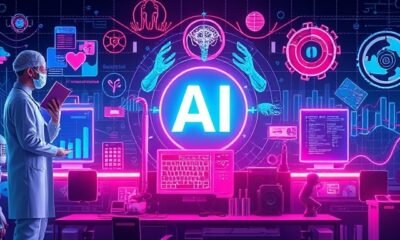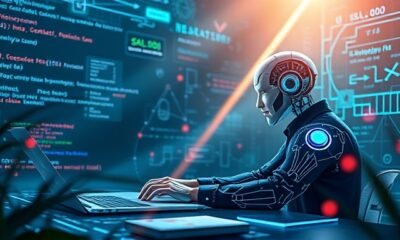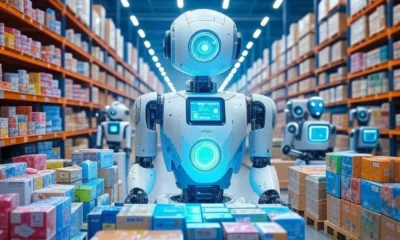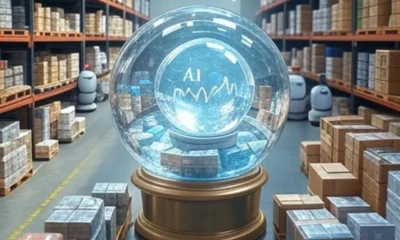Artificial Intelligence
Reducing human error with AI
Human error can cost businesses time and money, but AI offers a smart solution to reduce mistakes. In this article, I explore how AI cuts errors and delivers real return on investment.

An introduction on why it is important to reduce mistakes caused by humans. At one time or another, each of us has made an error on the job. It can occur for no other reason than a typing mistake. At other times, the mistake could be big such as delivering the wrong item or forgetting a crucial safety inspection. At the start such problems may appear simple, but they have the power to become big financial issues for businesses.
Definition:
AI is used to identify, prevent or fix the errors that happen because of human actions at work.
I have observed that a single mistake can result in customers being unhappy, the business losing money or possible legal problems. This is why I’m serious about trying to prevent those errors before they occur. Greatly improved artificial intelligence solutions are now enabling businesses to find answers faster.
In the following blog, I’ll explain how AI plays a big role in preventing human errors. I will walk through various examples, clarify the benefits and show why you can get a big return from AI. Anyone like me, interested in efficient and intelligent processes, will discover a lot at Unicon.
Types of Human Errors Often Found in Several Industries:
Human error has shown up in unexpected areas for me in different industries. A small mistake with a label or number in retail and logistics can easily slow down shipments and disturb customers. A mistake as tiny as a slip-up in healthcare could be very serious for someone’s health.
Many errors start to happen during repetitive work. Being in front of a screen for long periods can make people weary, easily distracted or overwhelmed. It’s natural. There is a greater likelihood of making a mistake when you process a lot of data, pick goods or answer a lot of emails all at once.
Pressure from the situation can make even simple tasks challenging, not the tasks themselves. People usually make poor choices when they are stressed. Managers sometimes act only using their intuition and this approach tends to lead to bigger problems later on. Here, accuracy is most important such as in finance or during severe emergencies.
AI Can Prevent Mistakes Made by Humans:
Over the long term, AI is better than any human at performing repetitive tasks. Data sorting, duplicate finding and form filling can all be done by AI without getting tired or having to stop. With this, the rate of typos, blank fields or accidental deletions drops, so fewer human errors occur.
What I find really exciting is AI’s ability to aid decision-making. It learns what’s happening, rather than just guessing and discovers info that I wouldn’t notice. AI guides me to take the right actions in healthcare and finances by using its quick analysis.
AI can sense problems that may arise in advance. There are tools in place that alert the team when things are not operating normally. Because of this heads-up, we can solve problems that haven’t happened yet. It is much simpler to avoid errors in the first place than to sort out the aftermath.
Practical Ways Error Reduction Is Achieved with AI:
AI was very helpful in preventing a lot of small, yet important errors. AI in medicine lets doctors check a patient’s symptoms against millions of previous cases. Because of this support, the risk of making the wrong diagnosis drops and the patient’s care is improved.
In logistics, AI has made warehouse operations faster by looking after the amount of inventory and checking the accuracy of orders. These systems enable you to find errors during picking or shipping before the packages go out. As a result, items are less likely to be sent back and people will be happier.
AI is used by financial firms to find cases of fraud. Thousands of transactions are analyzed almost instantly by these systems and they quickly identify anything that seems suspicious. There are reports that banks caught attempts to steal money early and this would have not been possible for a human team.
There Are Other Uses Apart From Error Reduction Nutrition:
Pretty soon after using these tools, I could tell there was more to them than fixing grammar mistakes. Saving time was one of the biggest advantages. Jobs such as reviewing information or completing forms that needed hours earlier, now just took a fraction of the time because of AI. So, I was able to spend more time on planning and strategy.
A major success was also maintaining a consistent approach. An AI system never takes time off, nor does it ever forget things. they work in the same way every time. Being consistent helped me win the clients’ trust and give a better performance all the time.
It seemed that participants felt less anxieties as part of the team. Because AI did the routine and error full jobs, people had time to use their creativity. Personally, I noticed that this new approach lifted spirits, increased how well everyone did the job and made them happier with their roles.
Assessing the return on investment (ROI) of AI in reducing errors:
When checking the financial cost of human error, I was amazed at how high the numbers became quickly. One small blunder such as a problem with delivery might lead to big losses and those can add up quickly over the weeks. It was then that I decided to look at AI not only as a cost, but as a way to invest.
I compared the cost of errors arising from our old system to implementing AI each year to see the ROI. For example, with an AI tool costing $40,000 per year, my team will save $60,000 which is easily seen. Most companies, I think, earn back what they invested in R&D within a year or less.
Other benefits aren’t easily measured such as more satisfied clients and fewer problems with the law. Throwing in those benefits with the math only made the ROI better. AI wasn’t only a money saver it also made everything operate smoother, faster and with greater reliability.
There are a number of obstacles to be aware of:
Before I adopted AI, I had a few concerns and a few of them were true. I encountered my first difficulty in dealing with data quality. AI requires that the information fed to it is clean and accurate. Mixed or incorrect output data can show up even if the technology is advanced.
How much the process would cost in the beginning was another point to consider. AI does save money over time, but you have to spend a lot on tools, training and setting everything up at the start. I needed to be sure that the benefits would be greater than the initial costs.
Some of the team members also felt uncertain. Some people were concerned that AI would take their place and many didn’t have confidence in how AI would decide. I found success in telling people that AI helps people, not that it replaces them. After using it, they realized it was easier than they predicted.
Future Outlook:
When I see how much AI has progressed, I start to imagine what’s next in store for it. I think that, just like email and smartphones, AI will soon become a normal aspect of business. Big or small, businesses will use it to cut errors and make their operations more efficient.
AI shows an even greater potential by becoming smarter as time goes by. Because of adaptive learning, these systems are now correcting themselves more quickly and dealing with shifts in better ways. This leads to fewer software updates, less equipment breakdown and fewer mistakes which I think is really important.
Teamwork between people and machines seems like the way ahead. My best experiences have come when we use both our judgment and AI’s precision. This is really where things become exciting and your financial gains continue to increase all the time.
Conclusion:
According to my experience, AI limits human error by promoting smarter and safer working environments, not only by using technology. AI saves me from dealing with costly errors so I can use my valuable time on main concerns.
Using AI had a direct and noticeable effect on my business results. By doing so, I made fewer errors, people on my team felt better about working together and I was confident more errors weren’t being missed. When you want your business to become more dependable, AI can be very useful. Which mistakes have given you the most frustration at work? Do you now rely on AI to avoid mistakes? I would be very interested to learn what you think and go through. You are welcome to pass this on if it was helpful to you!
-

 Artificial Intelligence8 months ago
Artificial Intelligence8 months agoHow to Use Grok AI: A Complete Guide
-

 Artificial Intelligence10 months ago
Artificial Intelligence10 months agoWhat is Artificial Intelligence? A Comprehensive Guide for Businesses and Enthusiasts
-

 Artificial Intelligence9 months ago
Artificial Intelligence9 months agoUnlocking the Power of Artificial Intelligence Tools
-

 Artificial Intelligence9 months ago
Artificial Intelligence9 months agoWhat is DeepSeek? Revolutionizing AI with Cutting-Edge Solutions
-

 Artificial Intelligence5 months ago
Artificial Intelligence5 months agoAI Technologies in Warehouse Automation:
-

 Artificial Intelligence5 months ago
Artificial Intelligence5 months agoPredictive Analytics for Demand Forecasting:
-

 Artificial Intelligence6 months ago
Artificial Intelligence6 months agoMeta’s AI Push: The Standalone Assistant App Set to Rival ChatGPT
-

 Artificial Intelligence5 months ago
Artificial Intelligence5 months agoHow Artificial Intelligence is Revolutionizing Logistics:


